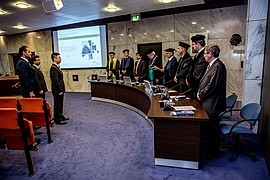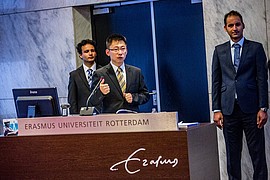PhD defence: Supply Chain Contracting for After-sales Service and Product Support

In his dissertation ‘Supply Chain Contracting for After-sales Service and Product Support’ ERIM’s Dong Li studies several nontrivial service contracting problems concerning optimal design of contract terms, spare parts inventory and service capacity management, and service outsourcing control. His main findings are:
- Under the Performance-based contracts (PBC), penalty of product unavailability based on the customer's lost revenue leads to a lower profit, and a longer warranty contract is better than PBC when the cost of part reacquisition is low.
- When outsourcing product service under PBC, sharing penalty of product downtime with the supplier is the best mechanism for the supply chain.
- If the supplier is risk-averse, fixed-fee contracts with no performance related terms may be the best contract. If the product failure rate is high, Time & Material contracts are be better than the uptime-based performance contracts.
Dong defended his dissertation in the Senate Hall at Erasmus University Rotterdam on Friday, 18 September 2015 at 9:30. His supervisor were <link people rene-de-koster>Professor Rene de Koster and <link people nishant-mishra>Dr. Nishant Mishra. Other members of the Doctoral Committee were Professor Serguei Netessine (INSEAD), Professor Geert-Jan van Houtum (Eindhoven University of Technology), and Dr. Vladimir Karamychev (Erasmus University).
About Dong Li

Dong Li (1984) was born in Qufu, China. He received his Bachelor's degree in Mechanical Engineering from Wuhan University of Science and Technology, Wuhan, China in 2006. Then, he joined the PhD program of Shanghai Jiao Tong University and received his Master's degree in Manufacturing Engineering in 2009. In the same year, he joined Rotterdam School of Management, Erasmus University as a visiting scholar. In 2011, he was admitted as a PhD candidate by Rotterdam School of Management, Erasmus University. His research interests include: Operations Management, Servitization, and Supply Chain contracting. His research findings have been presented in many international conferences such as INFORMS Annual Meetings (2011, 2012, 2013), POMS meetings (2012, 2013), and M&SOM conference (2012). Currently, he is a Research Fellow in Sustainable Operations Management at Singapore University of Technology and Design (SUTD).
Thesis Abstract

Over the past decades, business model innovation in product and its service has been growing rapidly, especially for durable goods. Companies shift their strategies from selling physical products to delivering solutions and performance for customers. Within this context, the outcome-based service contracts, such as Performance-based Logistics and Power-by-the-Hour, have been developed in both public and commercial industry. At the same time, traditional service contracts such as Warranty and Time & Material contracts are still being used in many occasions. Under various business models, managing the after-sales service and product support becomes increasingly challenging. In this thesis, we study several important service contracting problems concerning optimal design of contract terms, spare parts inventory and service capacity management, and service outsourcing management. We provide managerial insights for selecting the best service contract, choosing the right performance measurement, optimally managing the service resources (spare parts and repair capacity), and incentivizing the supplier to improve the profit of the after-sales service and product support supply chains
· View and download Dong's dissertation
Photos: Chris Gorzeman / Capital Images


